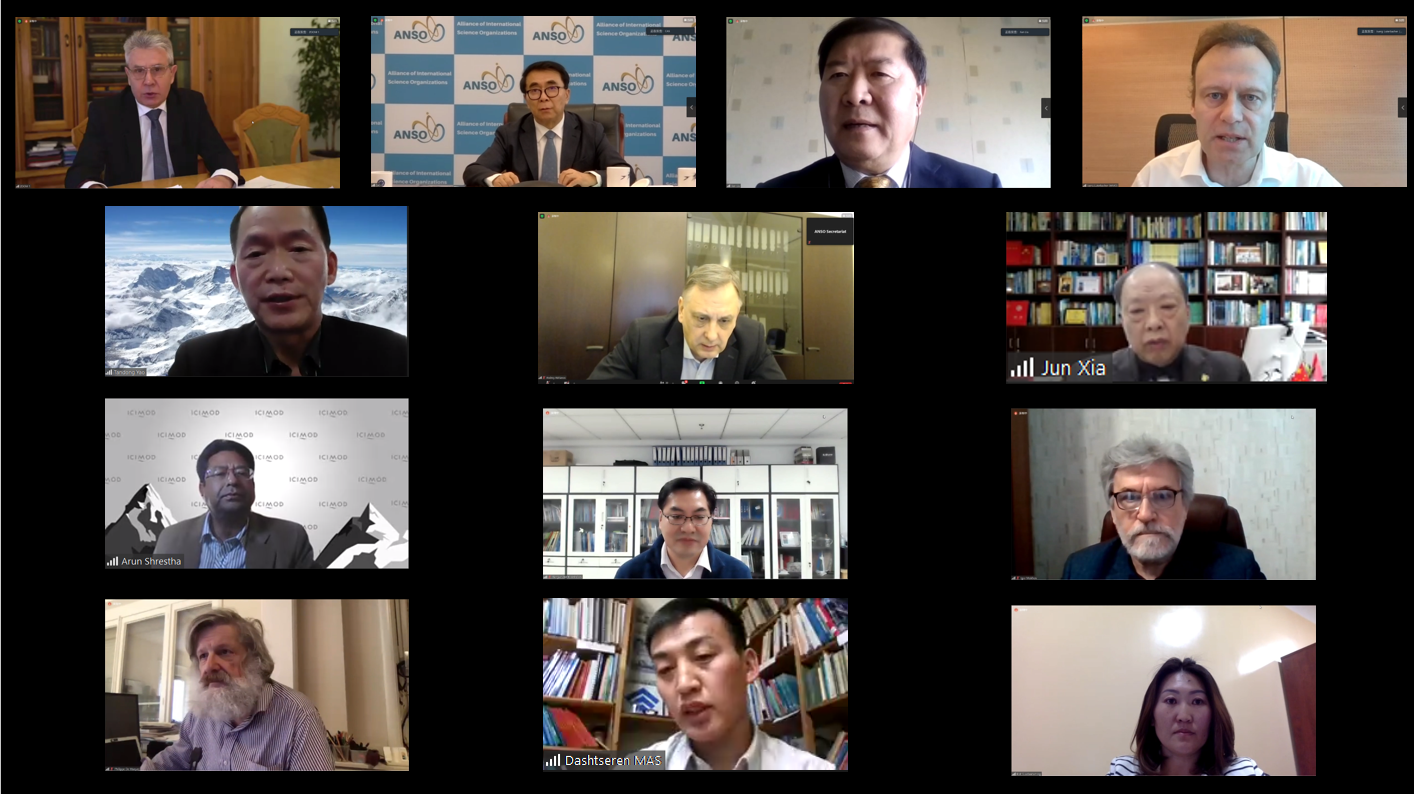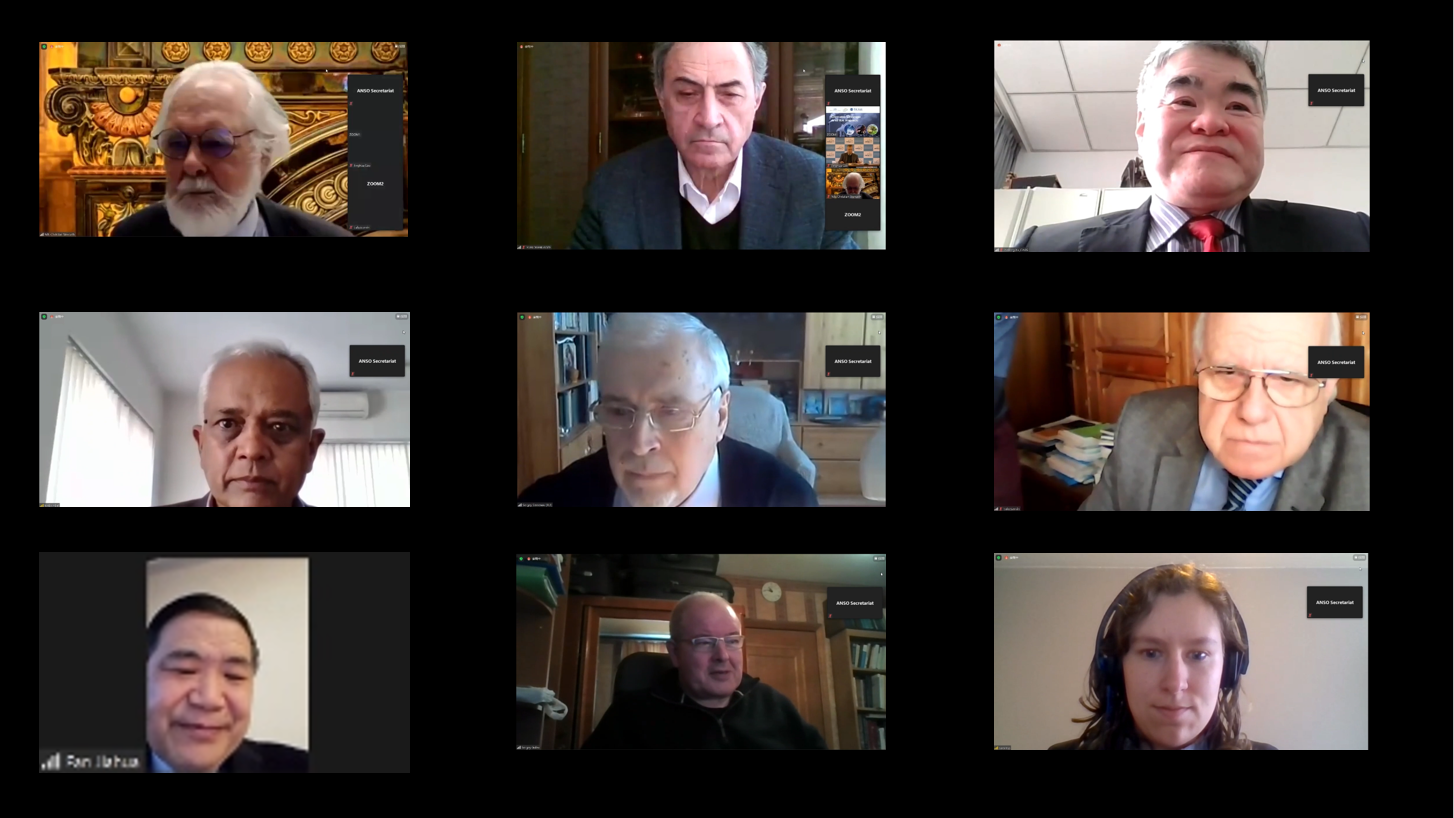The “ANSO Online Conference on Climate Change and Its Impact” was held on 2-3 March 2021. The Russian Academy of Sciences (RAS) played a particularly important role in the designing and coordination of the meeting. More than 20 top-level scientists from Russia, China, Belgium, Nepal, Mongolia, Hungary and Germany were invited to give presentations. At the high point of the meeting, more than 5,000 audiences were attracted to it via the live stream on YouTube and Bilibili.
Prof. Alexander Sergeev, President of RAS and Vice President of ANSO kicked off the meeting by offering some background information, saying that given the important significance of climate change, ANSO decided to start this year’s meeting series with this topic, to be followed by a number of other meetings in different other important topics: education and basic science, biodiversity and eco-environment, etc. Prof. Chunli Bai, President of ANSO, gave a warm welcome to all the participants on behalf of ANSO. He particularly stressed what the international scientific community should give more emphasis to facing climate change and in tackling the challenge, calling on a continuous emphasis on the research and investigation of some of key scientific issues and of technological options for the reducing of CO2 and the enhancement of multilateral and multi-disciplinary cooperation among ANSO members and other partners. Prof. Jian Liu, chief scientist of UNEP and Prof. Jürg Luterbacher, chief scientist of WMO, both highlighted the big gaps on climate change studies between developing countries and developed ones, especially in the B&R regions. They delivered firm messages of strengthening the capacity building of scientific research and policy making in these areas through international cooperation.
A number of talks concentrated on the evidence and projections of climate change in hotspot areas, such as the Tibetan Plateau, Hindu Kush Himalaya, Arctic, Far East of Russia and Northern Eurasia. The increasing glacier retreating, permafrost thawing and extreme weathers in past decades have brought significant impacts to the environment in these hotspots and their downstream regions. Due to increasing climate change, the developing countries suffer the most in the availability of water resources, biodiversity conservation, ecosystem services, food supply and energy security. Strategies for climate change mitigation and adaptation including how to reach carbon neutrality, particularly in the case of China were presented. Plans and studies for water management in the Yangtze River basin, ecological restoration in the Himalayan region and agriculture adaptation in the Asian and African regions were shared with the participants.
Prof. Yuri Balega, Vice President of RAS, and Prof. Jinghua Cao, Executive Director of ANSO Secretariat, co-chaired the workshop. Cao, in his wrap-up, highly appreciated the wisdom and stimulating ideas from all the speakers. He further emphasized that ANSO is keen to be a unifying platform to facilitate the international cooperation for the global challenges and the support from various people and institutions are of much importance to be of such a role.
 Check the video clips of key speeches below:
Check the video clips of key speeches below:
Talk 1: The Asian Water Towers in a warming climate
Tandong Yao | Institute of Tibetan Plateau Research, Chinese Academy of Sciences
Talk 2: Impact of climate changes to marine ecosystems in the Russian Far Eastern seas
Andrei Adrianov | Russian Academy of Sciences
Talk 3: Water security issue for changing environment in Yangtze River
Jun Xia | Wuhan University & Institute of Geographic Sciences and Natural Resources Research, Chinese Academy of Sciences
Talk 4: Water resources in Hindu Kush Himalayan and its possible fate under climate change
Arun Bhakta Shrestha | International Centre for lntegrated Mountain Development
Talk 5: Changes in Central Asian precipitation: past & future
Tianjun Zhou | Institute of Atmospheric Physics, Chinese Academy of Sciences
Talk 6: Climate anomalies, trends and impacts in the North Eurasian and Arctic regions
Igor Mokhov | Russian Academy of Sciences
Talk 7: Sino-Belgian Joint Laboratory for Geo-Information
Philippe De Maeyer | Ghent University, Belgium
Talk 8: Climate and environmental changes affecting pastoral systems in Mongolia
Avirmed Dashtseren,
Balt Suvdantsetseg
Mongolian Academy of Sciences
Talk 9: Joining forces in the study of climate change and biodiversity in a one-belt-one-road perspective with a focus on epidemic diseases
Nils Chr. Stenseth | University of Oslo & The Norwegian Academy of Science and Letters
Talk 10: The impact of climate change on biodiversity of Russia and adjacent territories
Yury Dgebuadze | Russian Academy of Sciences
Talk 11: Transforming agriculture from 'victim' to 'solutions' of climate change
Yinlong Xu | Chinese Academy of Agricultural Sciences
Talk 12: Ecological restoration as a means of managing degraded ecosystems in the context of changing climate
Kedar Rijals | Tribhuvan University
Talk 13: Greenhouse gases and changes in climate
Sergey Semenov | Russian Academy of Sciences
Talk 14: The necessity of improvement of agricultural practice in a sustainable manner
Ervin Balázs | ATK Center for Agricultural Research Martonvásár, Hungary
Talk 15: Carbon neutrality: International processes and China’s approaches
Jiahua Pan | Chinese Academy of Social Sciences
Talk 16: RAS-NAAD: 40-year high resolution north Atlantic atmospheric hindcast for multipurpose applications
Prof. Gulev S.K., Prof. A. Gavrikov, Prof. M. Markina, Prof. N. Tilinina, Prof. P. Verezemskaya | Russian Academy of Sciences
Talk 17: Investigating the impact of climate change and changes in climate extremes on the agriculture and forestry in the CORDEX Central Asia domain
Ms. Sara Top | Ghent University, Belgium


 Check the video clips of key speeches below:
Check the video clips of key speeches below: